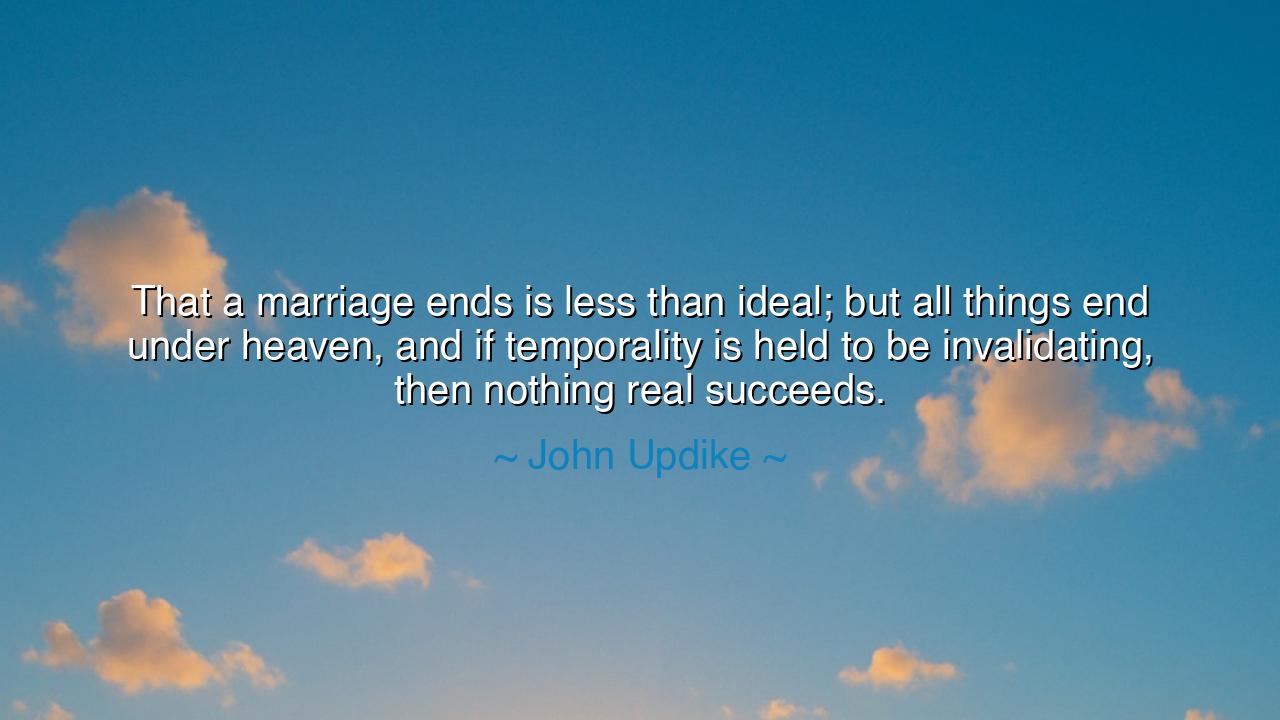
That a marriage ends is less than ideal; but all things end under
That a marriage ends is less than ideal; but all things end under heaven, and if temporality is held to be invalidating, then nothing real succeeds.






"That a marriage ends is less than ideal; but all things end under heaven, and if temporality is held to be invalidating, then nothing real succeeds." – John Updike
Children of the earth, hear this lesson, for it speaks to the very nature of life itself—the ebb and flow of existence, the rise and fall of all that is. John Updike, in his words, speaks a truth both timeless and profound. He reminds us that all things end under heaven, and with that, he acknowledges a universal law: the transience of life. Marriage, a bond so sacred and intimate, may indeed come to an end, but this does not diminish its value, nor the truth that it once held. In the end, tempus, the passage of time, is both our companion and our challenge. It moves with inexorable force, shaping and reshaping all that we hold dear, and if we measure the worth of something by its duration alone, we risk dismissing all that is truly meaningful.
Consider the great civilizations of the past—Rome, Greece, Egypt. Each rose to glory, each flourished in the beauty of its time, and each eventually fell into ruin. But does their impermanence invalidate their achievements? Were their accomplishments, their art, their knowledge, any less profound because they did not endure forever? Certainly not. Rather, it is the very ephemeral nature of life that gives it its preciousness. Just as a flower blooms only for a short while, so too does the beauty of love and marriage exist within the brief moment it is given. And even in its ending, the love once shared, the lessons learned, and the memories formed are no less real.
Reflect upon the story of Cleopatra and Julius Caesar. Their union, though marked by politics and power, was also a profound love, one that altered the course of history. Yet, as all things do, their time together ended, and soon after, both their lives and their reigns were snuffed out by the passage of time. Was their love, their marriage, any less significant because it ended? Of course not. In fact, their story has endured through the ages, teaching us the power of passion and ambition, and the fleeting nature of power itself. Their love, though brief, continues to echo in the hearts of those who study history, and in this way, its truth endures.
Marriage, like all aspects of life, is a fleeting thing, held in the grip of time. Yet this does not mean it is any less real. To deny the significance of a relationship simply because it has ended is to disregard the deeper meaning embedded in all things. Love, like life, is not meant to be eternal in its earthly form, but rather to exist in the moments we share, in the connections we make, and in the ways we grow together. If we hold only to the temporal—the idea that something must last forever to have value—we risk missing the essence of what makes all things precious.
In ancient wisdom, we are taught that life itself is temporary. The wise have long known that to hold on too tightly to the illusion of permanence is to live in denial of the truth of existence. Socrates, that great philosopher, spoke often of the transience of life. His very words—spoken as he awaited his death—are a testament to the acceptance of impermanence. He did not mourn the end of his life, for he understood that in every moment, there is something to be learned, something to be cherished. The same is true for marriage. When it ends, it is not an end of all that was shared, but a transition, a moment in time that holds its own beauty.
The lesson here, dear children, is simple yet profound: impermanence does not diminish the value of the real. Whether it is the end of a marriage, the fall of a great empire, or the passing of a life, we must not be blinded by the notion that if something does not last forever, it has no meaning. Life is fleeting, yes, but it is within this fleeting nature that we find its deepest worth. Every moment, every relationship, every experience holds within it something of great significance. To hold these moments dear, to see their beauty and their lessons, is to live with an open heart, willing to accept the transience of all things.
Practical action, children, is found in the way we live each day. Do not cling to the fear of endings, but embrace the fleeting nature of all that you hold dear. When love ends, let it go with gratitude for what it was, not with regret for what it is not. Cherish the relationships you have, knowing that they, too, are temporary. Build a life filled with meaning, knowing that every moment you share is precious, even if it is not eternal. And when it is time to let go, do so with grace, knowing that the real is never diminished by time’s passing—it only deepens with the wisdom of understanding.






AAdministratorAdministrator
Welcome, honored guests. Please leave a comment, we will respond soon